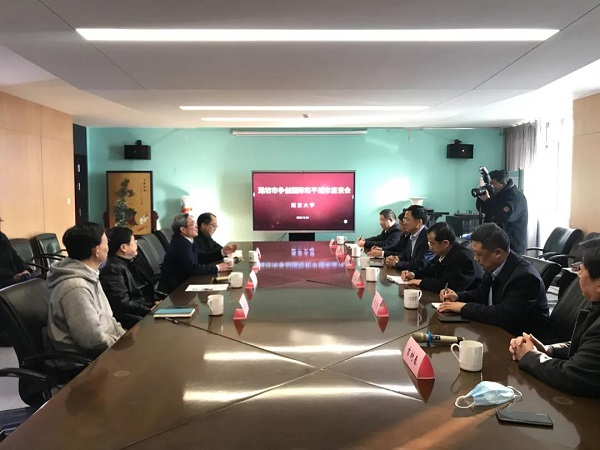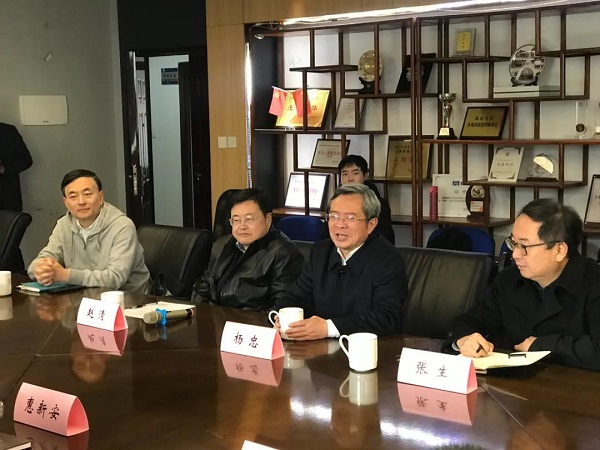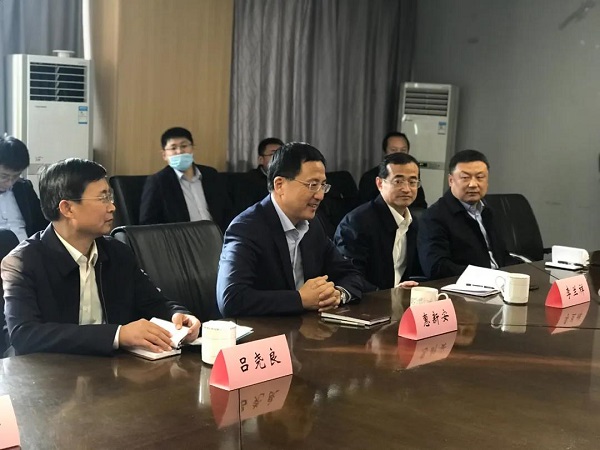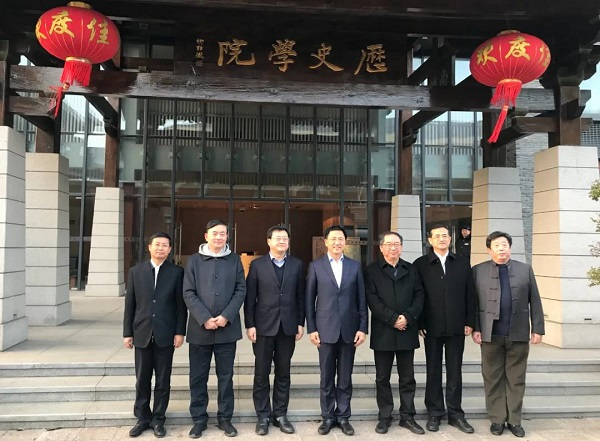Weifang City CPC Head Visits NJU to Promote Bid for International City of Peace
The delegation of the city of Weifang, Shandong province, discussed with Nanjing University leaders on the city’s bid for the International City of Peace during its visit to the university on the afternoon of December 3.

Yang Zhong, executive deputy secretary of the university’s CPC standing committee, together with leaders of the School of History and the head of the UNESCO Chair for Peace Studies, met Hui Xin'an, Weifang municipal CPC secretary and director of the standing committee of the municipal people's congress, and his delegation at the university’s School of History.
The two sides exchanged views on the cooperation in efforts at the city’s bidding for the International City of Peace.
On behalf of Nanjing University, Yang Zhong welcomed CPC secretary Hui Xin'an and his delegation and expressed gratitude to the Weifang municipal Party committee and government for their long-term care and support for Nanjing University. He hoped that the university and Weifang would continue to develop more extensive and in-depth cooperation and exchange in talent training.

Hui Xin'an said that Nanjing University, as a century-old institution with a long history and outstanding prestige, has trained a large number of high-quality scholars for the country and has also given great support for Weifang's work.
Weifang has a long history and profound culture with rich modern and contemporary cultural heritage, said Hui. In particular, its Ledaoyuan is the former site of a concentration camp the Japanese invaders set up for Western expatriates. It is now named as a "National Patriotic Education Demonstration Base" and a "National Key Cultural Relic Protection Unit" last year. In order to better protect historical and cultural resources and improve the level of its protection and utilization, it is planned to create the second "International City of Peace " in China (after Nanjing) and the first in Shandong Province.
Nanjing University has provided great academic support for Nanjing's bid for the International City of Peace. This time, it is hoped that the strengths of Nanjing University in research and talent cultivation can promote the cooperation and help Weifang to bid for the International City of Peace.

Zhang Sheng, dean of NJU’s School of History, pointed out that Nanjing University has a deep historical relationship with Weifang. John Calvin Ferguson, the founder and first dean of Nanking University (the former Nanjing University), was imprisoned by the Japanese in a concentration camp in Weifang after the outbreak of the Pacific War.
In recent years, Nanjing University has achieved fruitful results in war and peace studies, especially the growing international influence of peace studies under the auspices of Professor Liu Cheng, who has been awarded the first UNESCO Chair in Peace Studies in China and has established close cooperation with the Nanjing municipality and many other places in China. It is expected that peace studies and other related disciplines at Nanjing University will play an active role in Weifang’s bid for the International City of Peace.
Liu Cheng, a professor of the School of History of Nanjing University, chairman of the UNESCO Chair in Peace Studies, and a member of the Association for International Cities of Peace (the only Asian member), pointed out in his speech that building the Weifang Concentration Camp Museum with the intention of peace and using it as an opportunity to bid for the International City of Peace would be of great significance in enhancing Weifang's international influence and shaping China's image of peace.
He suggested that the construction of Weifang as a city of peace start with details, and the city systematically carry out peace research, peace education and peace activities so as to create a new demonstration effect across the country and drive more cities to incorporate peace into the concept of city development.
Liu Cheng also said that he would fully support Weifang's bid for the International City of Peace and will carry out more cooperation with Weixian Concentration Camp Museum.
Ji Shuchun, director of Weifang Museum, said that the opening of the Weixian Concentration Camp Museum and the bid for of the International City of Peace have been highly valued by leaders at all levels. The preliminary work of the bidding is in smooth progress and has achieved great results. He hoped to sign a five-year cooperation agreement with Nanjing University soon and looked forward to setting up a branch venue for the Nanjing Peace Forum in Weifang.
Hui Xin'an further stated that the experience of Nanjing University and the Chair of Peace Studies has important inspiration and reference for the internationalized construction of the Concentration Camp Museum. He hoped that the two sides will advance the signing of the cooperation agreement as soon as possible, and systematically plan for broader and in-depth cooperation including the bid for the International City of Peace.
Zhao Qing, CPC secretary of the School of History of Nanjing University, concluded that it is of great significance for Weifang to bid for the International City of Peace. The two sides have reached agreement on deepening cooperation, and the School of History will also do its utmost to provide support. He hoped that Weifang and Nanjing University would continue to expand cooperation on the basis of bidding for the International City of Peace.

Together with CPC secretary Hui Xin'an on the visit to Nanjing University were Li Lanxiang, a member of Weifang’s CPC standing committee and secretary-general, Lyu Yaoliang, Weifang municipal CPC committee’s deputy secretary-general and director of the political research office, Xin Lianguo, Weifang municipal CPC committee’s deputy secretary-general and director of the Reception Center, Zhao Wenguo, deputy director of Weifang Investment Cooperation Promotion Bureau, and Ji Shuchun, director of Weifang Museum and research fellow.
Relevant personnel from the UNESCO Chair of Peace Studies attended the meeting.
(Article written and edited by Huang Muyu and proofread by Li Siqi.)

